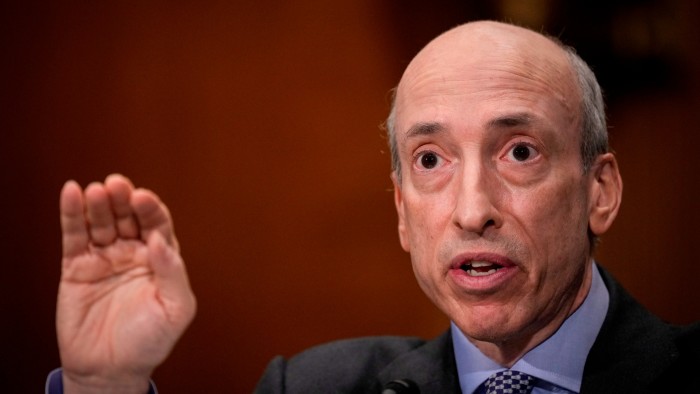Fund industry braced for SEC crackdown on deceptive product labels

Simply sign up to the Fund management myFT Digest -- delivered directly to your inbox.
US financial watchdogs are pushing ahead with a crackdown on deceptive fund names, despite industry warnings that it will discourage stock picking, violate free speech protections and force funds to sell assets at a loss when markets are volatile.
Consumer groups say the proposed change, which would require a broad swath of funds to prove that 80 per cent of their holdings match their names, is badly needed to prevent funds from drifting away from their stated purpose. They say investors who opt to buy a fund labelled “value” or “sin stocks” or “small cap” should get exactly what they are paying for.
The proposal, which the Securities and Exchange Commission will take up on Wednesday, is an update to its two decade old “names rule”.
The current version applies mostly to concrete terms such as “bond” or “equity” and explicitly excludes thematic investment strategies. The proposed update applies to a much broader range of fund names, including those focused on “environmental, social and governance” investing, and would for the first time set a firm deadline for funds that fall out of compliance to get back to the 80 per cent threshold.
“The names rule is a core investor protection disclosure rule that seeks to ensure that investors are not misled by the labels attached to funds. It’s overdue for an update,” said Stephen Hall, legal director of Better Markets, which lobbies for increased investor protection. “Investors often rely on a fund’s name when making investment decisions.”
When proposing the update last year, SEC chair Gary Gensler said that as a result of the industry’s development, “gaps in the current names rule may undermine investor protection”, with some funds claiming the rule does not apply “even though their name suggests that investments are selected based on specific criteria or characteristics”.
Industry participants say the changes are not needed and will discourage fund managers from giving their products descriptive names. “This is a very blunt proposal . . . The result is going to be very short names that don’t say anything,” said Stephen Bradford of the lobbying group the Investment Company Institute. It told the SEC in a comment letter that the proposal could violate investment managers’ right to free speech.
Rajib Chanda, partner at the law firm Simpson Thacher, said: “What the SEC now seeks to do is, in the guise of ESG regulation, overhaul [a] rule which frankly . . . didn’t need an overhaul.”
Chanda added: “If you take the ESG parts of the proposal out . . . a lot of the things that they’re doing in the context of the rule more broadly are somewhat a solution in search of a problem.”
Industry groups argue the proposal to require funds to get back to 80 per cent within 30 days will lead to forced sales and make it hard for portfolio managers to stay with investments they believe in — such as if a small-cap company grows into a mid-cap, or an investment-grade bond is downgraded to high-yield.
“Markets can be dislocated for more than 30 days,” said George Raine, a partner at law firm Ropes & Gray. “The expectation that you have to sell into a bad market and buy other things you don’t want is completely inefficient.”
The industry is particularly concerned about applying the 80 per cent rule to “growth” and “value” funds, because different companies define those strategies differently, and to “global” funds, because some funds that are currently described as global have up to 60 per cent of their holdings in the US.
Corey Rose, partner at Dechert, said capturing “global” funds was an example of a measure that “is uniquely unworkable in the current proposal”, especially in the context of assessing investments individually: “There are no Martian securities. All securities are on this globe.”
The industry also worries that strict limits would prevent some funds from investing in established companies that are moving into a new area — such as an ESG fund wanting to back an oil major’s efforts to become more green.
The SEC declined to comment on the scope of the final rule and on public comments about the proposal, but Abigail Hemnes, a partner at K&L Gates, said the regulator might strip out the ESG section because a separate proposal on that type of fund will be coming later.
Otherwise, fund executives said they believe much of the rule amendments will go through as first proposed. In recent weeks, the SEC staff has warned some investment managers to take a second look at proposed names for new funds that would not be covered by the current rule, but would be affected by the draft proposals, industry insiders said. The SEC declined to comment on the reported warnings.
Letter in response to this article:
In an age of greenwashing, appropriate fund names matter / From Philip Morris, Saint-Cloud, France
Comments